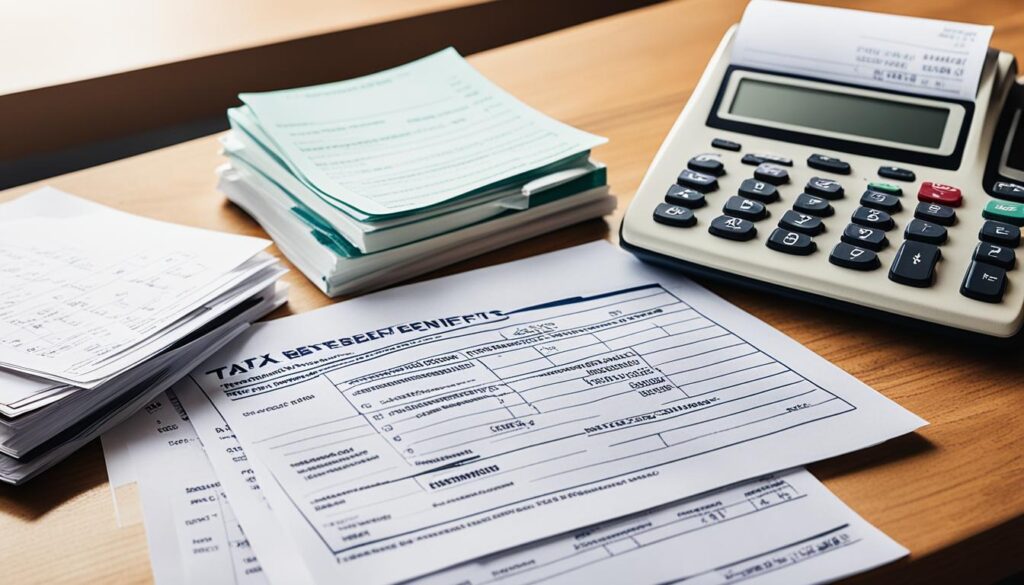Are you curious about whether you can deduct your tutoring expenses on your taxes? It’s a common question, and the answer may surprise you. While there are certain educational expenses that are eligible for tax deductions and credits, tutoring expenses have specific guidelines that determine their deductibility.
So, are tutoring expenses tax deductible? In this article, we’ll dive into the IRS guidelines for tutoring deductions and explore the tax benefits for tutoring. We’ll also discuss the documentation required to maximize your tax benefits and clarify any misconceptions about deducting tutoring costs. Get ready to uncover the truth behind tutor expenses and taxes.
Key Takeaways:
- Tuition and fees no longer qualify as tax deductible after 2020.
- Work-related education expenses may be deductible for self-employed individuals but not for employees.
- Student loan interest is still tax deductible.
- Certain educational expenses can be counted towards tax credits like the American Opportunity Credit and the Lifetime Learning Credit.
- Insurance, medical expenses, transportation, and living expenses are generally not qualified education expenses for tax benefits.
What Educational Expenses Are Tax Deductible?
When it comes to tax time, knowing which educational expenses are tax deductible can help you save money and maximize your tax benefits. While tuition and fees are no longer eligible for tax deductions after 2020, there are still other types of expenses that you may be able to deduct.
For employees, work-related education expenses are generally not deductible from 2018 to 2025. However, if you’re self-employed, you may still be able to deduct these expenses, as long as they are directly related to your business or trade.
Did You Know? Student loan interest is still tax deductible if the loan was used for qualified education expenses. This can be helpful in reducing your overall tax burden.
Certain expenses like books, supplies, and equipment may also be included for tax credits such as the American Opportunity Credit and the Lifetime Learning Credit. These credits can provide additional tax benefits and help offset the cost of education.
However, it’s important to note that insurance, medical expenses, transportation, and living expenses are generally not eligible for tax benefits related to education.
| Expense | Tax Deductible |
|---|---|
| Tuition and fees | No |
| Work-related education expenses (for employees) | No (from 2018-2025) |
| Work-related education expenses (for self-employed) | Yes |
| Student loan interest | Yes (if used for qualified education expenses) |
| Books, supplies, and equipment | May be eligible for tax credits |
| Insurance, medical expenses, transportation, and living expenses | No |
Understanding which educational expenses are tax deductible can help you plan your finances and make the most of available tax benefits. As always, it’s important to consult with a tax professional for personalized advice and to ensure that you meet all the necessary requirements for claiming deductions or credits.
Tax Deductions for Homeschooling Expenses

When it comes to homeschooling expenses, you may be wondering if there are any tax breaks available. While homeschooling expenses generally cannot be directly deducted on federal taxes, there are some potential deductions and credits that homeschool families can consider.
Special Education Expenses Deduction: If you incur special education expenses for your homeschooled child, such as hiring a tutor or providing special instruction, you may be eligible for a tax deduction. These expenses can be deducted as medical expenses under the IRS guidelines if they meet certain criteria.
Charitable Contributions: Donations made to nonprofit homeschool associations or contributions of materials can often be deducted on your taxes. By supporting these organizations and contributing materials, you not only help other homeschooling families but also potentially lower your tax liability.
Tax Credits: While homeschooling deductions may be limited, some states offer tax credits specifically for homeschooling families. For example, states like Illinois, Indiana, Louisiana, Ohio, and Minnesota provide tax credits that can help offset homeschooling expenses. Be sure to check with your state’s tax authority to see if any credits are available to you.
Tax-Deferred 529 Savings Plans: Another option to consider is utilizing a tax-advantaged 529 savings plan. These plans allow you to save for college and higher education expenses, including tuition, in a tax-advantaged manner. While homeschooling expenses may not be directly deductible, saving for future educational expenses can still provide long-term tax benefits.
While the tax benefits for homeschooling expenses may not be as extensive as those for traditional educational expenses, it’s still worth exploring the potential deductions and credits available to you. Remember to keep detailed records of your expenses and consult with a tax professional for guidance tailored to your specific situation.
Now, let’s take a look at a table summarizing the potential tax deductions and credits for homeschooling expenses:
| Tax Benefits | Description |
|---|---|
| Special Education Expenses Deduction | Deductible special education expenses, such as tutors or special instruction, may qualify as medical expenses. |
| Charitable Contributions | Donations to nonprofit homeschool associations or contributions of materials may be deductible. |
| Tax Credits | Some states offer tax credits specifically for homeschooling families to help offset expenses. Check your state’s tax authority for details. |
| Tax-Deferred 529 Savings Plans | Saving for college and higher education expenses, including tuition, in a tax-advantaged manner. |
While homeschooling expenses may not provide as many tax deductions as traditional educational expenses, exploring these options can still provide some relief on your tax bill. Remember to consult with a tax professional and keep accurate records to ensure you maximize your tax benefits.
Deducting Job-Related Education Expenses
Are you looking to advance your career through education? Good news! Job-related education expenses can be tax deductible. But before you start celebrating, you need to know the rules and guidelines for deducting these expenses.
First and foremost, for expenses to be tax deductible, they must maintain or improve skills required for your current job or be required by your employer. So, the key is to ensure that the education you pursue is directly related to your employment.
Note: Courses that are unrelated to your job or qualify you for a new trade or profession are not eligible for deductions.
Once you’ve determined that your education is job-related, you can start calculating your deductions. It’s important to note that job-related education expenses must be itemized on Schedule A, and they must exceed the 2% of your adjusted gross income threshold for miscellaneous deductions.
| Expenses | Tax Deductible |
|---|---|
| Tuition and fees | Yes, if required by employer or maintaining/improving skills |
| Books and supplies | Yes, if required by employer or maintaining/improving skills |
| Professional development courses | Yes, if required by employer or maintaining/improving skills |
| Travel expenses | Yes, if directly related to job-related education |
Don’t forget that job-related education expenses don’t just stop at deductions. You might also qualify for additional tax benefits, such as the American Opportunity Credit and the Lifetime Learning Credit. These credits can further reduce your tax liability and provide even more savings.
So, if you’re considering furthering your education to enhance your career, remember that job-related education expenses can potentially save you a significant amount when it’s time to file your taxes.
Deducting Education Expenses for Self-Employment
As a self-employed individual, you can take advantage of tax benefits by deducting your education expenses for your trade or business. This allows you to lower your taxable income and potentially reduce your tax liability.
To qualify for the education expenses deduction for self-employment, the course you pursue must meet certain criteria:
- The course must maintain or improve the skills required in your trade or business.
- The course should be required by law or regulation to keep a professional license in your field.
It’s important to note that education expenses that qualify you for new trades or businesses or simply meet minimum requirements for your current trade or business are not deductible.
Allowable expenses that you can deduct include:
- Tuition
- Books
- Fees
- Equipment
- Transportation
- Other directly-associated costs
However, it’s worth mentioning that travel as a form of education or the dollar value of vacation time used for attending classes are not deductible.
To better understand how the deduction for self-employed education expenses works, let’s take a look at a sample table:
| Expense | Amount |
|---|---|
| Tuition | $1,500 |
| Books | $200 |
| Fees | $300 |
| Equipment | $500 |
| Transportation | $200 |
| Other directly-associated costs | $400 |
| Total Deductible Expenses | $3,100 |
By deducting these education expenses, you can reduce your taxable income by $3,100, potentially resulting in significant tax savings.
Remember to keep proper documentation of your expenses and consult with a tax professional to ensure you are accurately claiming deductions for your self-employed education expenses.
Other Tax Benefits Related to Education Expenses

While deducting educational expenses can provide significant tax savings, it’s important to explore other tax benefits that can further maximize your savings. These additional tax benefits include:
- Education Credits: In addition to deductions, you may be eligible for education credits. Education credits directly reduce the amount of tax you owe, providing a dollar-for-dollar reduction. The two main education credits are the American Opportunity Credit and the Lifetime Learning Credit. Make sure to evaluate which credit provides the greatest benefit for your specific situation.
- Employee-Business Expense Deduction: If you are self-employed, you may be able to deduct your education expenses as business expenses on Schedule C. This can include costs related to continuing education or specialized training that are necessary for your trade or business. Keep track of all expenses associated with your education to ensure accurate documentation.
By strategically utilizing various tax benefits, you can maximize your overall tax savings related to education expenses. It’s important to evaluate the potential tax savings of each method to determine the most advantageous approach for your specific situation.
Additional Resources
For more detailed information on tax benefits for education, consult the following resources provided by the IRS:
- Publication 970: Tax Benefits for Higher Education
- Publication 463: Travel, Entertainment, and Gift Expenses
- Publication 535: Business Expenses
These resources will provide valuable insights and guidance to help you navigate the complex realm of tax benefits for education.
The Importance of Documentation for Education-Related Tax Benefits

When it comes to claiming education-related tax benefits, proper documentation is key. Without the necessary paperwork, you may miss out on valuable deductions and credits. So, let’s dive into the importance of maintaining records and what documentation you need to maximize your tax benefits.
Why Documentation Matters
Whether you’re a student or a parent, keeping track of your education expenses is crucial for claiming tax benefits. Documentation provides proof of your eligible expenses and helps support any deductions or credits you plan to claim.
But why is it so important? Well, without proper documentation, the IRS may question the validity of your claimed expenses, resulting in potential penalties or denied benefits. So, don’t let your hard-earned tax savings slip away – make sure you have the required paperwork in order.
Required Paperwork for Education Deductions
So, what paperwork do you need to secure those education deductions? Here are some key documents to gather:
- Form 1098-T: Many schools provide this form, which reflects the amount of tuition and fees you’ve paid. It’s an important document that helps validate your education expenses.
- Payment Receipts: Collect all payment receipts showing the payment of qualified education expenses. These receipts serve as additional evidence of your educational costs.
- Other Statements: Any statements or documents that support your claimed expenses, such as receipts for books, supplies, equipment, and other education-related items.
By organizing and keeping these documents, you’ll have a robust paper trail to support your education deductions and ensure you receive the maximum tax benefits.
Maintaining Records for Education Expenses
It’s not just about having the right documents – you also need to maintain organized records of your education expenses. This includes:
- Tracking Books and Supplies: Keep a record of the books, supplies, and equipment you purchase for your education. Note down the purchase dates and costs to provide accurate and detailed information.
- Recording Other Education Expenses: Don’t forget to document other education-related expenses like transportation costs, tutoring fees, and any other eligible costs you incur.
By maintaining comprehensive records, you’ll have a clear picture of your education expenses and make it easier to claim the deductions and credits you’re entitled to.
Remember, accurate documentation and record-keeping are your allies when it comes to education-related tax benefits. By diligently collecting and organizing the necessary paperwork, you’ll have peace of mind knowing that you’re maximizing your tax savings. If you’re uncertain about eligibility or need assistance, consult with tax professionals to guide you through the process.
| Required Documentation | Importance |
|---|---|
| Form 1098-T | Provides official documentation of tuition and fees paid. |
| Payment Receipts | Serves as proof of payment for qualified education expenses. |
| Other Statements | Supports claimed expenses for books, supplies, and other educational items. |
Conclusion
As you navigate the complex world of taxes, it’s important to recognize the potential benefits of deducting tutoring and educational expenses. While some expenses may no longer qualify for deductions, there are still options like tax credits and other tax benefits available to help alleviate the financial burden of education.
However, to ensure you maximize your tax deductions and credits, it’s crucial to maintain proper documentation and have a clear understanding of the IRS guidelines. Keeping organized records of payments, receipts, and other documentation related to your educational expenses is key.
For personalized advice and guidance tailored to your specific situation, consulting with trusted tax professionals can provide valuable insights. They can help you identify eligible expenses, navigate the intricacies of tax regulations, and make informed decisions that optimize your tax savings.
By taking advantage of the available tax breaks, you can reduce your tax bill and allocate those savings towards furthering your education or achieving other financial goals. Remember, education is an investment in yourself and your future, and through careful planning, you can make the most of the tax benefits available to you.








